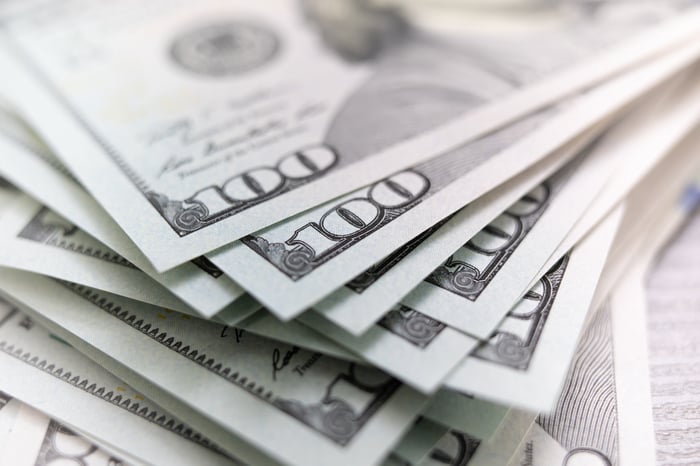There's little doubt that 2020 will not soon be forgotten by the American public. The coronavirus disease 2019 (COVID-19) pandemic has left an indelible mark on society, with nonessential shutdowns costing more than 20 million Americans their jobs, and the U.S. death toll rising beyond 125,000.
It was this unprecedented physical and financial shock that coerced Congress to pass, and President Trump to sign, the Coronavirus Aid, Relief, and Economic Security (CARES) Act on March 27.

Image source: Getty Images.
The CARES Act threw a lot of money at an unprecedented problem
At $2.2 trillion, the CARES Act is the costliest piece of relief legislation ever signed into law. Without getting into the minutiae, it provided $500 billion to distressed industries and close to $350 billion for small business loans, gave $100 billion to help hospitals fight the coronavirus, and allocated $260 billion for the expansion of the unemployment benefits program.
But what the vast majority of Americans will remember about the CARES Act is whether or not they received a direct stimulus payment following its passage. That's because the CARES Act apportioned $300 billion in stimulus money for American workers and senior citizens. Through the first week of June, some 159 million Economic Impact Payments had been sent out by the Internal Revenue Service, totaling $267 billion.
Unfortunately, throwing a lot of money at the problem hasn't been the surefire solution that Washington, D.C., was hoping for. An additional round of funding was needed to support small businesses, and pressure has been mounting on lawmakers to come together to pass a second round of stimulus, with the intention being that the American public would receive more cash in hand.

Image source: Getty Images.
Yes, a second stimulus package is likely -- here's why
The prevailing question has been, "Will Congress pass another stimulus package?" And if so, when?
To answer that question, I do believe another round of stimulus is coming, and it'll be approved before the month of July comes to a close. Here are five reasons you should expect a bipartisan stimulus bill sometime this month.
1. The first round of stimulus didn't do enough
The most obvious reason for a second round of stimulus is that the CARES Act simply didn't do enough from an individual standpoint. Though the CARES Act helped bail out troubled industries, such as the airlines, a Money/Morning Consult poll from April found that a whopping 74% of respondents had spent, or expected to spend, their stimulus money in four weeks or less. While the Economic Impact Payments received were very much needed, they, in some instances, didn't even cover one months' worth of expenses for recipients.

Image source: Getty Images.
2. Enhanced unemployment benefits are slated to end after July 31
Another reason a second round of direct stimulus is likely is due to the imminent end of enhanced unemployment benefits.
As noted, the CARES Act allocated $260 billion to expand the unemployment program for a period of four months (April through July). This expansion took the form of an extra $600 a week in payments to approved unemployed beneficiaries. For some unemployed Americans, this extra $600 a week has been the difference between making ends meet and not being to put food on the table or keep a roof over their heads.
If enhanced unemployment benefits are allowed to expire at the end of this month, there's a really good likelihood that we'll see a surge in the number of mortgage, rental, and auto loan delinquencies beginning in August or September.

Image source: Getty Images.
3. A second wave of infection is slowing down the recovery process
The slow recovery from the shutdown of nonessential businesses and the growing likelihood of a second wave of infection also makes a second stimulus package likely.
Despite "record" retail sales growth in May, most industries have dealt with a 20% to 60% drop-off in revenue from before the COVID-19 shutdowns. As a result, the economy is opening up slowly, rather than snapping back to where it was in February. In fact, the Federal Reserve is forecasting that the unemployment rate will remain at 9.3% by year's end, which is close to the high from the Great Recession.
This is worrisome given that the number of confirmed infections have been hitting all-time daily highs in the United States. The economic recovery is already moving slowly, and it could become even more sluggish if rising infection rates prompt business closures or force additional shutdowns.

Image source: Getty Images.
4. It's election season, and both parties want to look good
Fourth, don't overlook the fact that we're in the midst of an election year. Neither the Democrats nor Republicans wants to be viewed as the party that didn't go to bat for the American worker. Passing another round of stimulus would not only help some folks make ends meet, but it would be a talking point that lawmakers could use when it comes time to sway voters headed to the polls.
It may not be the altruistic solution that the American public is expecting of lawmakers, but there's definitely incentive for both parties to find a middle-ground solution with less than four months left until Election Day.

Image source: Getty Images.
5. It'll be needed to soften the blow to the financial sector
Finally, a second stimulus package may become necessary to soften the blow on the financial sector.
Thus far, financial institutions have been more than willing to offer concessions to homeowners and borrowers given the financial shock many have endured. But banks and credit unions fully expect these outstanding loans to be made whole -- and that may not happen. The end of enhanced unemployment benefits, coupled with a second wave of infection, could be the catalyst that sends mortgage, auto, and commercial loan delinquencies through the roof.
To be fair, the nation's biggest banks have a considerable amount of capital at their disposal now, relative to the financial crisis more than a decade ago. Nevertheless, an exogenous shock like the coronavirus pandemic could wreak havoc in a shorter time frame than anyone could have predicted. The fact is that even beefed-up bank stock balance sheets may not be able to withstand the onslaught.
Without additional stimulus in the hands of Americans, and perhaps for the financial sector, things could get far worse in the months to come. This is why a second stimulus package should be considered a given, in my view, before the end of July.






